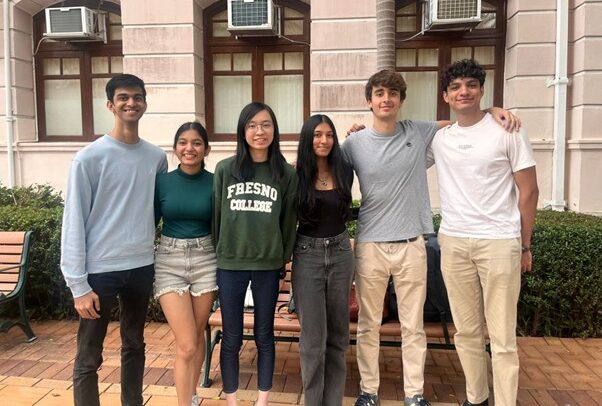Six students from HKU Law’s experiential and interdisciplinary Law, Innovation, Technology and Entrepreneurship Lab (LITE Lab@HKU) were announced the winners of the Inter-University GenAI Hackathon for Sustainable Development Goals’s Resilient and Adaptable Communities theme (https://www.hack4sdg.com/) for their creation of MigrAssist, a chatbot that helps migrant workers in Hong Kong understand their rights, stay updated on legal changes, and easily connect with related NGOs. The MigrAssist team comprises of Debby Wong Cheuk Ki (HKU BSc&LLB); Krish Gupta (HKU BASc Fintech); Krish Patel (HKU BASc Design+); Krisha Sheth (HKU BASc Design+), Pushti Shah (Griffth BA & LLB – Australia) and Pablo Cruz Sobrino (UPF Barcelona BBA/LLB – Spain).
Led by founding executive director, Mr Brian Tang, LITE Lab@HKU is a core part of HKU’s BASc (Fintech) and BASc (Design+) degrees, and empowers law students to learn to work in teams with students from diverse backgrounds in computer science, business and design to ideate, prototype and pitch legal-related digital artifacts as part of the innovative course, which is popular with international exchange students who often say this type of curriculum is not offered in their home law schools.
This year, LITE Lab’s courses are focussed on AI-native startups and law firms, and students were given the choice to align their projects with the GenAI Hackathon SDG themes or create an AI-native law firm. As part of their design thinking process to create MigriAssist, the team requested Mr Tang put the team in touch with Hong Kong NGO HELP for Domestic Worker’s executive director Manisha Wijesinghe, who helped them better understand the challenges faced by Hong Kong’s migrant workers to refine and strengthen their AI solution. Through the process, the team trialled and prototyped with different AI no-code and vibe coding platforms and had hands-on experience learning the pros and cons of using AI, especially as it relates to the high level of precision required for the provision of legal services.
In the words of Pushti Shah, who is a 2025 New Colombo Plan Scholarship recipient: “It was an exciting interdisciplinary project where we learned from one another and discovered each team member’s strengths. Although we didn’t have much prior coding or AI expertise, our passion and curiosity drove us to explore new tools and turn our idea into something practical. For most of us, the hackathon was outside our comfort zone, but with the support of LITE Lab and Brian’s encouragement, we pushed through and created a product that was both innovative and hackathon-winning.”
In the words of Debby Wong Cheuk Ki, who is in the inaugural double Bachelor of Law and Science degree programme: “During my legal studies, there were few team projects. This LITE Lab course and competition provided me with the opportunity to collaborate with students from diverse fields, including Fintech, Design+, and Law. Throughout the process, I learned the importance of teamwork and how we can leverage each other’s strengths. For instance, some team members excel in visual design for presentations, others are skilled in conducting legal research and red teaming, while some are adept at technology. I am grateful to have worked alongside such excellent teammates on this project.”
About The Hong Kong Inter-University GenAI Hackathon for Sustainable Development Goals
Funded and supported by the University Grants Committees’ Fund for Innovative Tech-in-Education (FITE) grant, this annual Hong Kong-wide university hackathon competition aims to encourage the application and entrepreneurship of multimodal Generative Artificial Intelligence (GenAI) technologies towards socially beneficial purposes and the United Nations Sustainable Development Goals (UN SDGs). Applications centred on 4 themes, namely (1) Youth Empowerment and Inclusive Futures; (2) Resilient and Adaptable Communities; (3) Sustainable Design and Biodiversity; and (4) Artistic and Cultural Innovation are invited. 10-11 teams in each track were selected to pitch at the final demo on 1 November 2025, competing for Gold, Silver and Bronze prizes. The MigrAssist team is awarded the Gold Prize under track “Resilient and Adaptable Communities”.


